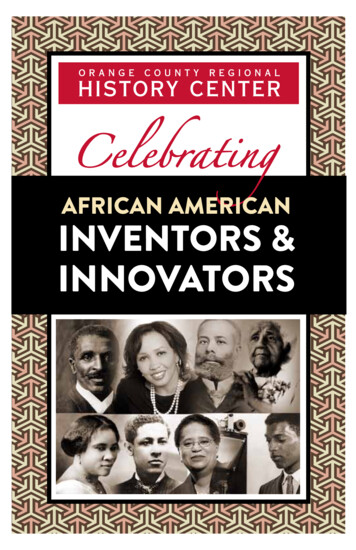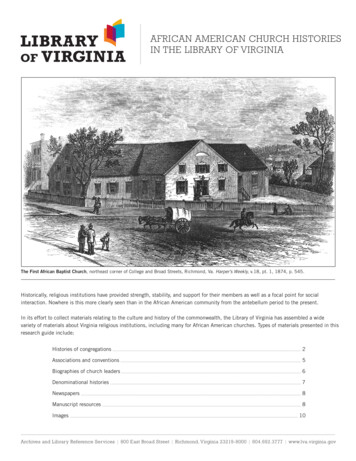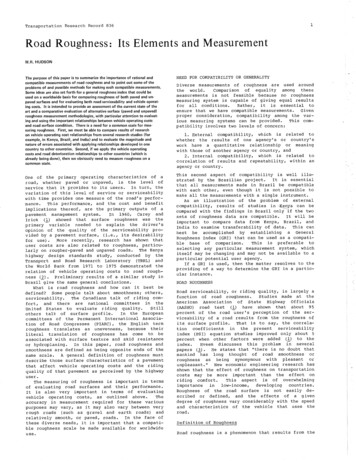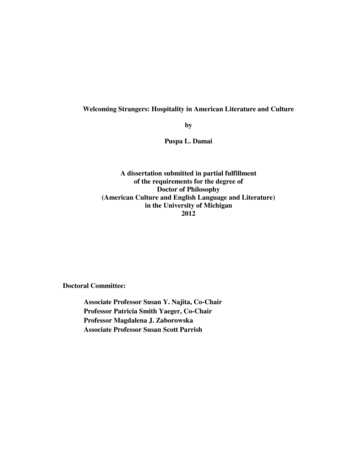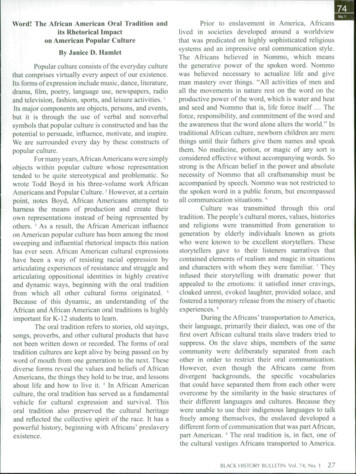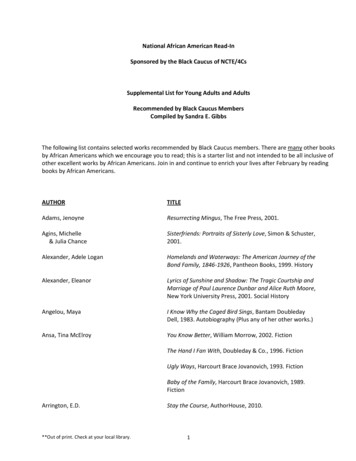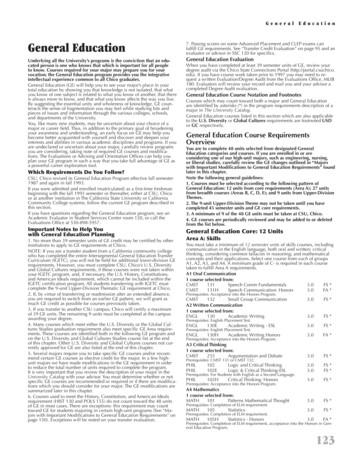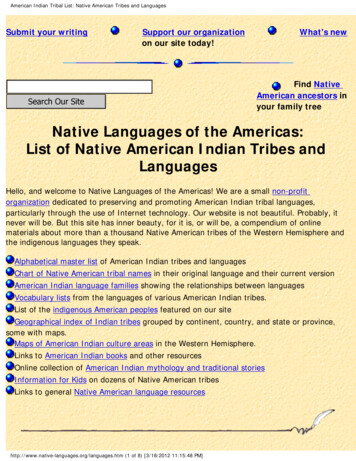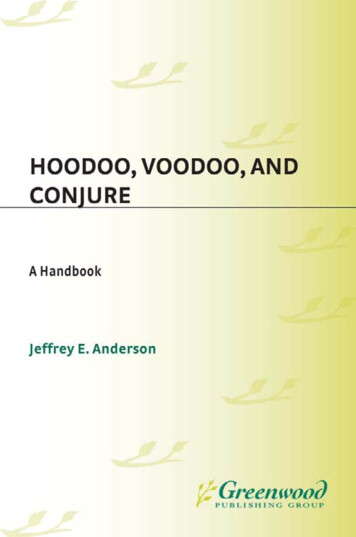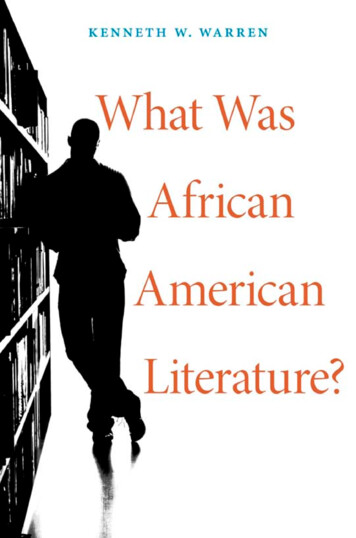
Transcription
What Wa s Afr ican Amer ican Lit er atur e ?T he W. E. B. Du Boi s Lect ur es
What WasAf r ican A mer i c a nLit er atu r e ?Kenneth W. WarrenH a r va r d U n i v e r s i t y P r e s sCambridge, Massachusetts, and London, England2011
Copyright 2011 by the President and Fellows of Harvard CollegeA LL R IGHTS R ESERV EDPrinted in the United States of AmericaLibrary of Congress Cataloging- in-Publication DataWarren, Kenneth W. (Kenneth Wayne)What was African American literature? / Kenneth W. Warren.p. cm.Includes bibliographical references and index.ISBN 978- 0- 674- 04922-2 (alk. paper)1. American literature—African American authors—History and criticism—Theory, etc. 2. African Americans in literature. I. Title.PS153.N5W348 2010810.9'896073—dc222010015714
In memoriamAutry L. WarrenNora Frances Warren
ContentsAcknowledgments1. Historicizing African American Literatureix12. Particularity and the Problem of Interpretation443. The Future of the Past81Conclusion: The Past in the Present118Notes151Index169
Ac know ledgmentsMy thanks to Henry Louis Gates Jr. and to the W. E. B. Du BoisInstitute for the opportunity to give the 2007 W. E. B. DuBois Lectures, which form the basis for this book. A portion ofChapter 2 was delivered as “W. E. B. Du Bois’s Dusk of Dawn:The End of a Beginning in African Americanist Inquiry” at theHart Institute at Pomona College as part of its 2002–2003 Lecture Series “Public Intellectuals/Public Issues.” I’m also indebted to the participants in the American Cultures Workshopat the University of Chicago for helpful responses to portionsof the text. And as always, thanks to Maria.
What Wa s Afr ican Amer ican Lit er atur e ?
1His tor icizing Afr ican Amer icanL i t e r atur eHistorically speaking, the collective enterprisewe now know as African American or black literature is ofrather recent vintage. In fact, the wine may be newer than generally acknowledged, which is to say that it was neither pressedon the African continent nor bottled during the slave era.Rather, African American literature was a postemancipationphenomenon that gained its coherence as an undertaking inthe social world defined by the system of Jim Crow segregation,which ensued after the nation’s retreat from Reconstruction.This social order, created by local and statewide laws, statutes,and policies, received constitutional sanction in 1896 with theU.S. Supreme Court’s decision in Plessy v. Ferguson and was maintained for decades by violence and intimidation, buttressednot only by the work of scholars, scientists, artists, and writersbut also by the quotidian social practices of ordinary citizens.Yet it was through many of these same means that this orderwas challenged and sometimes acquiesced in by its victims until it was finally dismantled, at least judicially and legally, in1
histor icizing afr ican amer ican liter atur ethe 1950s and 1960s. African American literature took shapein the context of this challenge to the enforcement and justification of racial subordination and exploitation represented byJim Crow. Accordingly, it will be my argument here that withthe legal demise of Jim Crow, the coherence of African Americanliterature has been correspondingly, if sometimes imperceptibly,eroded as well.Admittedly, my insistence on this rather constricted historical frame for something called African American literaturemay seem at the very least counterintuitive and at the mostsimply wrongheaded. Indeed, much recent literary criticism andscholarship has sought to justify taking a longer historicalview of African American literary practice. Some have arguedthat African American literary texts are distinguished by theway black authors, consciously and unconsciously, have workedand reworked rhetorical practices, myths, folklore, and traditions that derive from the African continent. Others havemaintained that African American literary texts are defined bya prolonged engagement with the problem of slavery, a systemof labor exploitation that was central to the development ofnot only the United States but the whole of the Western world.Those making the latter claim have held that writing againstor under the influence of the slave regime has defined not onlythe literature written prior to abolition but also subsequentblack literary practice, because black literary practice as awhole has been indelibly marked by the ways that enslavedblacks coped with the brutalities of the Middle Passage, whenmillions of Africans were transported from Africa to theAmericas, and chattel slavery.12
histor icizing afr ican amer ican liter atur eAlso arguing against the view I am taking here is that individuals of African descent certainly wrote during the periodbefore the historical advent of Jim Crow America and have continued to do so, in ever increasing numbers in the years sincethe dismantling of de jure segregation some forty-five yearsago. Why should the works of Phillis Wheatley, Jupiter Hammon,Frederick Douglass, and so many others written during theantebellum period not count as African American literature?And what of the undeniable fact that African Americans continue to write what they understand to be African Americanliterature? To insist that African American literature “was” is toraise the question of what all of this ongoing production “is.”The last of these objections might have been met more easilyhad I given this book the title What Was Negro Literature? For itis undeniable that while most, if perhaps not all, of the writerswho published work during the Jim Crow era understood themselves to be Negro writers—publishing, sometimes willingly,sometimes unwillingly, Negro literature—no (or at least veryfew) contemporary writers of African descent describe themselves as writers of Negro or colored literature, preferringinstead black or African American—a difference that reflectsbroad and significant social and political changes. Indeed whencontemporary writers do allow themselves to indulge a fondness for earlier nomenclature, they tend to do so nostalgically,reproachfully, or perhaps in a manner combining both moods.One example is a brief exchange in Andrea Lee’s episodic 1984novel Sarah Phillips where, upon hearing the white girlfriendof the title character’s brother urge him to “do a black historyproject on your family,” the narrator’s elderly Cousin Polly3
histor icizing afr ican amer ican liter atur eobjects, saying, “I don’t like that word ‘black.’ . . . Colored folksused to think that word was an insult!” Of course, embeddedwithin Cousin Polly’s objection is her disapproval not only ofthe word itself but of the interracial relationship she is beingpresented with, and the paradox that only in a world where“black” and “African American” prevail as favored terms willthe genteel sons and daughters of the colored elite be ableroutinely to consider, even if only to reject, the possibility ofmarrying “outside” the race. For a character whose “southernvoice” has already prompted the novel’s eponymous heroine todescribe the old woman as “a living fossil, one of the Paleozoiccreatures that are periodically discovered in deep waters,” itwill clearly not avail to learn that “black” is not an insult butmerely “what kids are saying now.”2Yet, however small the number of people at the present moment who share the full measure of Cousin Polly’s distaste forthe word “black” (or her association of the term with interracialism), her belief that the bygone era when we were all colored (toparaphrase the titles of two mid-1990s memoirs by, respectively,Henry Louis Gates Jr. and Clifton Taulbert) may still surpassthe post–Jim Crow world in terms of nurturing a sense of groupcohesiveness and pride has found ready affirmation among avariety of critics and writers.3 And though this nostalgic yearning rarely crystallizes as an injunction to rehabilitate this olderterminology, it does coalesce in a concern that the baby of racialunity is in danger of being thrown out with the bathwater ofsegregation just at that moment when such unity is presumedto be as necessary as ever.4
histor icizing afr ican amer ican liter atur eThat these changes in preferred nomenclature, from “colored”and “Negro” to “black” and “African American,” can be correlated, however imperfectly, with the political and legal dismantling of Jim Crow does raise the question of whether or not theseshifts marked more than a shift in terminology.4 My contentionis that to a great extent something significant has changed. Yetmy decision not to use “Negro” literature in my title was determined by a sense that African American writers and critics ofthe postsegregation era have often remained oriented by theproject of Negro literature as it was defined by responses to JimCrow—partly as a result of the above-mentioned nostalgia,but more fundamentally as a consequence of believing that, insome crucial ways, Jim Crow has not ended and that in “theaftermath of the civil rights movement, the most obvious expressions of segregation and discrimination gave way to morecovert but equally pernicious manifestations of racism.”5 Myobjection to this point, which will be elaborated upon morefully as this argument unfolds, is not that racism has disappeared from the nation’s sociopolitical landscape, but thatpointing out the persistence of racism is not to make a particularly profound social observation or to engage in trenchantpolitical analysis. Rather, I think it important to see that apolitical and social analysis centered on demonstrating thatcurrent inequalities are simply more subtle attempts to reestablish the terms of racial hierarchy that existed for much ofthe twentieth century misunderstands both the nature of theprevious regime and the defining elements of the current one.By glancing at a few relatively recent texts, I hope to show that5
histor icizing afr ican amer ican liter atur ethis previous orientation can no longer provide coherence for acontemporary African Americanist literary project. As DanielleAllen has argued, the period between the Brown v. Board of Education decision in 1954 and the passage of the Voting Rights Actin 1965 constituted an “epochal shift in the country’s history . . .[that] remain[s] still undigested.”6As for the status of the fiction, poetry, and letters writtenbefore the Jim Crow era, my claim is that the mere existenceof literary texts does not necessarily indicate the existence ofa literature. James Weldon Johnson’s introduction to SterlingBrown’s 1932 collection of poetry, Southern Road, expresses a viewalong the lines I’m tracing here. Johnson writes,The record of the Negro’s efforts in literature goes back a longway, covering a period of more than a century and a half, butit is only within the past ten years that America as a whole hasbeen made consciously aware of the Negro as a literary artist.It is only within that brief time that Negro writers have ceasedto be regarded as isolated cases of exceptional, perhapsaccidental ability, and have gained group recognition. It isonly within these few years that the arbiters of Americanletters have begun to assay the work of these writers by thegeneral literary standards and accord it such appraisal as itmight merit.7Although Johnson’s words provide plenty to quibble with, including (for my purposes) the exactness of his chronology, hisobservation helpfully distinguishes between the existence ofwriters from an ascriptive group (even writers whose merit is6
histor icizing afr ican amer ican liter atur ebroadly acclaimed) and the conceptualization of works bymultiple authors from this group as a literature. The former doesnot depend on the latter. In Johnson’s brief comments, 1920sblack writers such as Brown, Langston Hughes, and ClaudeMcKay were writers of Negro (African American) literature,while figures such as Phillis Wheatley or Frederick Douglasshad been simply Negroes who were writers—or perhaps onecould helpfully say that they were writers who were not yetNegro writers and that antebellum writing by black Americansbecame African American literature only retroactively. 8 I’ll addhere that while I think my claim in regard to antebellum blackwriting is correct, my argument does not stand on making itcategorical. That is, I would be willing to concede in the face oftextual evidence that some black writing before the Civil Warwas understood by its practitioners and readers as somethinglike a distinct literature, but I would still insist that whateverthis literature was, it was changed significantly by the necessityof confronting the constraints of the segregation era. Indeed, itwas largely in the light of imperatives determined by the JimCrow era that antebellum texts were assimilated into the collective project we recognize as African American literature.Of course, this being said, it bears observing that the transformation of “not yet x” writers into the status of ancestorsand progenitors of more recent authors is a prerequisite forestablishing any national literature, a fact that, in turn, raisesthe question of whether or not the observations I am makinghere significantly distinguish African American literaturefrom other literatures. By way of providing an answer, I’ll turn7
histor icizing afr ican amer ican liter atur ebriefly to a core insight in Erich Auerbach’s Literary Languageand Its Public, which has been suggestive in helping me articulate my sense that African American literature might be viewedas a “historical” entity rather than as the ongoing expression ofa distinct people. Writing in the late 1950s, Auerbach asserted,European civilization is approaching the term of its existence; its history as a distinct entity would seem to be at anend, for already it is beginning to be engulfed in another,more comprehensive unity. Today, however, Europeancivilization is still a living reality within the range of ourperception. Consequently . . . we must today attempt to forma lucid and coherent picture of this civilization and its unity.9With some significant qualifications, I am arguing here that,mutatis mutandis, African American literature as a distinctentity would seem to be at an end, and that the turn to diasporic, transatlantic, global, and other frames indicates a dimawareness that the boundary creating this distinctiveness haseroded.What I’m interested in pursuing here is not Auerbach’s“method” of attending to the historical processes, institutionaleffects, and social pressures as these broader forces are reflectedin and refracted through authorial style. Rather, I’m more interested in Auerbach’s insights that these contextual forcesshape a shared set of assumptions about what ought to be represented and that as these contexts themselves undergo change,those representational and rhetorical strategies that at theirpeak served to enable authors and critics to disclose various8
histor icizing afr ican amer ican liter atur e“truths” about their society can begin to atrophy and becomeconventionalized so that they no longer enable literary texts tocome to terms with social change but operate instead as practices of evasion. Along this line, my argument is that AfricanAmerican literature is not a transhistorical entity within whichthe kinds of changes described here have occurred but thatAfrican American literature itself constitutes a representationaland rhetorical strategy within the domain of a literary practiceresponsive to conditions that, by and large, no longer obtain.From this standpoint, recent claims that either distinctlyAfrican traditions or the experiences of slavery and the MiddlePassage constitute the center of African American imaginative and expressive practice should be seen as symptoms ofthe breakdown of a former coherence. The “public” of African American literature was the public, both black and white,defined by the assumptions and practices of the segregationera. Whether African American writers of the segregation eraacquiesced in or kicked against the label, they knew what wasat stake in accepting or contesting their identification as Negrowriters. By contrast, the entailments of being regarded or notbeing regarded as an African American writer at the presentmoment are comparatively less clear. My argument presumes,then, that African American literature can be treated as a historical designation that exhibits both the precision and thefuzziness accompanying all period labels. Of course, any insistence on historical periodization is justified only if it leads tointerpretive clarity. My contention here is that this periodization can aid our interpretive efforts by drawing attention to9
histor icizing afr ican amer ican liter atur esome of the factors that almost unavoidably oriented AfricanAmerican literary practice during the Jim Crow era. Specifically,black writers knew that their work would in all likelihood beevaluated instrumentally, in terms of whether or not it couldbe added to the arsenal of arguments, achievements, and propositions needed to attack the justifications for, and counteractthe effects of, Jim Crow. As James Weldon Johnson observed in1928, “I judge there is not a single Negro writer who is not, atleast secondarily, impelled by the desire to make his work havesome effect on the white world for the good of his race.”10 Writersalso knew that their work would likely be viewed as constitutingan index of racial progress, integrity, or ability. Added to thiswas the paradox that the success of black literature as a politicaltool threatened to undermine its status as an index of blackintegrity. The pressure exerted by these instrumental or indexical expectations shows up not only in the way that writers andcritics regard African American literary texts but also withinthe works themselves.To paint in somewhat broad strokes, “The After-Thought”to W. E. B. Du Bois’s The Souls of Black Folk, in which DuBois pleads that his “book fall not still-born into the worldwilderness,” exemplifies an “instrumental” understanding of hisown book as having been written to achieve a social end.11 Onthe other hand, Du Bois expresses an “indexical” view of AfricanAmerican literary writing when he puts forward the “SorrowSongs” as evidence of the inner nature and capacity of the Negrorace, or when he writes in “The Negro in Literature and Art”(1913) that the “time has not yet come for the development of10
histor icizing afr ican amer ican liter atur eAmerican Negro literature” because “economic stress is toogreat and the racial persecution too bitter to allow the leisureand the poise for which literature calls.”12 To expect literatureto serve as an indictment of this economic stress and racialopinion is to make an instrumental demand on literary practice; to expect African American writers to produce great literature once economic stress and persecution wane is to take anindexical view of literature.That Du Bois approaches literature both instrumentallyand “indexically” should make it clear that these two termscannot produce a neat taxonomy of African American writers,or even African American texts, for that matter. That is, myaim here is not to define one set of writers who can be groupedunder the heading “instrumental” and another set under the“indexical” label. Nevertheless, it might be possible to credit aclaim that “instrumental” applies better to a writer like SuttonGriggs, who was more likely to treat his fiction as merelyanother means of achieving the same social ends he pursuedthrough his essays, lectures, sermons, and the like, than it doesto someone like Claude McKay, who insists that his racialidentity was so inescapably part of his work and the work of allgreat writers that “a discerning person would become immediately aware that I came from a tropical country and that I wasnot, either by the grace of God or the desire of man, born white.”That is, McKay, despite his political activities, was more inclinedto view writing as an end in itself than was Griggs, for whomsocial and moral ends were always paramount. In describinghis approach to his writing, McKay insisted that while his11
histor icizing afr ican amer ican liter atur e“social sentiments were strong, definite and radical,” he nonetheless “kept them separate from [his] esthetic emotions, for thetwo were different and should not be mixed up.”13 By contrast,such mixing defines Griggs. And yet, even Griggs was not indifferent to the idea of a novel as an art form whose successfulexecution would redound to the credit of the race as a whole.“Observe that all of the races of mankind that have achievedgreatness have developed a literature,” Griggs wrote in hisbook of philosophical and ethical musings, Life’s Demands; or,According to Law. He continued:Not a single race that has no literature is classified as great inthe eyes of the world. . . .Where people have not the habit of reading there will notbe much writing. The future progress of the Negro race callsfor an awakening on the part of the people to the necessity ofcultivating the habit of reading and stimulation of the artof making literature as indispensable aids to the developmentof the spirit of patriotism.14Here, the instrumental and the indexical intertwine as Griggscombines a hortatory call for blacks to read and write literature with a view of literary achievement as a metric for assessing the progress of the race as a whole. Likewise McKay, despitehis insistence to the contrary, did not fully insulate literaturefrom political ends. As every student of the Harlem Renaissance knows, McKay’s most famous poem, “If We Must Die,”was taken as an eloquent protest against the violence of the RedSummer of 1919, when race riots broke out in cities and towns12
histor icizing afr ican amer ican liter atur eacross the United States, including most prominently, Chicago,Washington, D.C., and Elaine, Arkansas.The point here is that no writer of this period could operateindifferently either to the expectations that African Americanliterature ought to contribute demonstrably to some social endor to the belief that novels, poems, or plays constituted proxiesfor the status or the nature of the race as a whole. Writers could,and did, insist that their works be judged without regard totheir identities and without reference to the political or socialstatus of the black race, but the mere insistence was an acknowledgment of the pressure of these expectations.It is also true, however, that calls for writers to do their partin achieving social ends were not indifferent to art’s specialstatus as a realm apart. Even Du Bois’s well-known claim in“Criteria of Negro Art” that “all Art is propaganda and evermust be, despite the wailing of purists” is not so much a disparagement of the idea that art should be an end in itself as itis an argument that, for the time being, art must serve instrumentally as “propaganda for gaining the right of black folk tolove and enjoy.” In other words, until society realized the conditions in which black artists could practice art as an end initself, art would have to bear the burden of serving as a meansto an end. The recognition of African American art simply asart would depend on society’s achievement of racial equality.Or, as Du Bois writes, once “the ultimate art coming fromblack folk” is deemed “to be just as beautiful, and beautifullargely in the same ways, as art that comes from white folk,or yellow, or red”—that is, once “the art of the black folk13
histor icizing afr ican amer ican liter atur ecompells [sic] recognition, [then black folk] will . . . be ratedas human.”15Such a view has not fared well in recent decades. Writingin the late 1980s, Henry Louis Gates Jr. remarked on and lamented the role played by indexical and instrumental imperatives in producing black literature. Tracing the problem backto the eighteenth century and Thomas Jefferson’s dismissal ofPhillis Wheatley’s poetry as lacking originality, and thereforeas an indication of the inferior status of the race as a whole,Gates writes,Unlike almost every other literary tradition, the Afro Americanliterary tradition was generated as a response to eighteenthand nineteenth-century allegations that persons of Africandescent did not, and could not, create literature. Philosophersand literary critics, such as Hume, Kant, Jefferson, and Hegel,seemed to decide that the absence or presence of a writtenliterature was the measure of the potential, innate humanityof a race. The African living in Europe or in the New Worldseems to have felt compelled to create a literature both todemonstrate implicitly that blacks did indeed possess theintellectual ability to create a written art and to indict theseveral social and economic institutions that delimited thehumanity of all black people in Western cultures.16Gates adds, “Few literary traditions have begun or been sustained by such a complex and ironic relation to their criticism:allegations of an absence led directly to a presence, a literatureoften inextricably bound in a dialogue with its potentially14
histor icizing afr ican amer ican liter atur eharshest critics.” Accordingly, Gates writes, “black criticism,since the early nineteenth century, seems in retrospect to havethought of itself as essentially just one more front of the race’swar against racism,” which meant that “an author tended to bejudged on his or her fidelity to ‘the Black Experience.’ ” Gatesdescribes this conception of critical practice as “a dead end forblack literary studies.”17As I hope is clear to my reader by now, my claim is that hadAfrican American literature not been viewed “as essentiallyjust one more front of the race’s war against racism,” it wouldnot have existed as a literature. So although Gates is rightin noting that racist assumptions did mar much criticism ofblack literature, his complaint conflates levels of observationthat were better kept separate. For example, it is important torecognize that Jefferson’s reprehensible criticism of Wheatleydid not stem from an expectation on his part that distinctraces ought to produce distinct literatures. Rather, he wasdecrying what he believed to be the absence of any worthyachievement by blacks in the literary and creative arts. In thesame section of Notes on the State of Virginia in which he disparages Wheatley, Jefferson also faults Ignatius Sancho, whom heranks as the more accomplished of the two but still places at“the bottom of the column” of literary achievement for failingto evince the “sober reasoning” appropriate to his subject.18 Thenorms championed by Jefferson, while applied invidiously, arenot norms that align specific peoples with specific literary sensibilities. The alleged shortcomings of black writers as notedby Jefferson, and the response of black writers throughout the15
histor icizing afr ican amer ican liter atur eeighteenth and first half of the nineteenth centuries to chargesof black intellectual inferiority, were not expressed as a failureto achieve a literature but rather as a failure to achieve in literature. The literary societies that Elizabeth McHenry describesas proliferating among free blacks in the antebellum north werenot workshops for the production of a distinct black literaturebut salons for producing works of literary distinction.19By contrast, the imperative to produce a black literaturecould not become fully operative until later in the century. Itwas only subsequent to the abolition of slavery that black andwhite writers in the U.S. context came collectively to hold therace accountable for producing a literature. Whether writerscondemned slavery for the cruelties it visited upon black peopleor, like Booker T. Washington and (at various points) SuttonGriggs, they credited slavery for having introduced blacks toChristianity and the West, no one could argue that slavery provided the optimal conditions for producing a literature. To besure, the incorrigible Jefferson in Notes compared chattel slaveryin North America favorably with Roman slavery during theAugustan era to draw invidious distinctions between the capabilities of blacks and whites. But notwithstanding his conviction that literary genius could overcome the obstacles ofenslavement, widespread calls for the production of a literature by black Americans did not become standard until late inthe nineteenth century.20 At that point, despite the povertyfacing most of the former slaves and the political and socialbarriers erected against them, emancipation did unleash a hostof predictions that, in the wake of abolition, the nation and16
histor icizing afr ican amer ican liter atur ethe world would see what the true capacities of the black racewere—an expectation voiced not only by skeptical whites butalso by black northern elites intent on proving the worth ofblack people and constituting themselves as the true representatives of the race.But there is more at stake here than distinguishing the JimCrow era from the preceding period. It is also important toplace in its appropriate context Gates’s desire to extricate African American literature from indexical assessments of racialprogress and instrumental responses to systematized secondclass citizenship. Problematic for Gates has been the way the“functional and didactic aspects of formal discourse assumedprimacy in normative analysis” of literary texts. Lamentingwhat he describes as a “confusion of realms,” Gates observes,“The critic became social reformer, and literature became aninstrument for the social and ethical betterment of the blackperson.”21 The issue here is not a matter of endorsing or dissenting from the idea of black literary critic as social reformer(although, as I’ve argued elsewhere, that posture at the presentmoment is often deeply problematic).22 Rather, I want to arguethe irrelevancy of bemoaning or advocating for what Gatessees as inattentiveness to literary matters among black writersand critics. One cannot treat African Am
Jim Crow. Accordingly, it will be my argument here that with the legal demise of Jim Crow, the coherence of African American literature has been correspondingly, if sometimes imperceptibly, eroded as well. Admittedly, my insistence on this rather constricted histori-c
